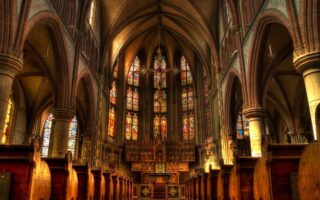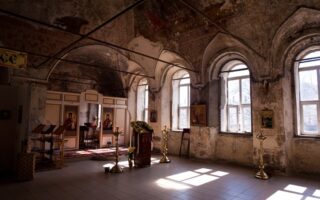The Catholic Mass is a sacred ritual that has been celebrated for centuries. It is a time for Catholics to come together to worship and celebrate the Eucharist. The Mass is a complex and beautiful ceremony that requires a great deal of preparation and understanding. In order to ensure that the Mass is valid, there are certain requirements that must be met. This article will discuss the requirements for a valid Catholic Mass.
Table of Contents
Exploring the Essential Elements of a Valid Catholic Mass
The Catholic Mass is a beautiful and meaningful ritual that has been celebrated for centuries. It is a time for Catholics to come together to worship God and to celebrate the Eucharist. The Mass is made up of several essential elements that are necessary for it to be a valid celebration.
The first element is the Liturgy of the Word. This is when the priest reads from the Bible and gives a homily. During this time, the congregation listens and reflects on the readings and the homily.
The second element is the Liturgy of the Eucharist. This is when the priest consecrates the bread and wine, which become the body and blood of Christ. The congregation then receives Communion.
The third element is the Prayers of the Faithful. This is when the congregation prays for the needs of the Church, the world, and for those in need.
The fourth element is the Dismissal. This is when the priest sends the congregation forth to go and serve God in the world.
These four elements are essential for a valid Catholic Mass. They are the foundation of the Mass and help to make it a meaningful and powerful experience.
Examining the Role of the Priest in a Valid Catholic Mass
The role of the priest in a valid Catholic Mass is an important one. He is the leader of the liturgy and is responsible for ensuring that the Mass is celebrated in accordance with the Church’s teachings. The priest is the one who presides over the Mass and is the one who consecrates the bread and wine. He is also responsible for proclaiming the Word of God and for leading the congregation in prayer.
The priest is the one who begins the Mass by greeting the congregation and introducing the liturgy. He then leads the congregation in the opening prayer and the Penitential Rite. During the Liturgy of the Word, the priest reads the Scripture readings and gives the homily. He then leads the congregation in the Profession of Faith and the General Intercessions.
At the Liturgy of the Eucharist, the priest is the one who consecrates the bread and wine. He then leads the congregation in the Lord’s Prayer and the Communion Rite. After Communion, the priest gives the final blessing and dismisses the congregation.
The priest is also responsible for ensuring that the Mass is celebrated in a reverent and dignified manner. He should ensure that the liturgy is celebrated with reverence and that the congregation is attentive and respectful. He should also ensure that the liturgy is celebrated in accordance with the Church’s teachings and that all participants are properly prepared to receive the Eucharist.
The role of the priest in a valid Catholic Mass is an important one. He is the leader of the liturgy and is responsible for ensuring that the Mass is celebrated in accordance with the Church’s teachings. He is the one who presides over the Mass and is the one who consecrates the bread and wine. He is also responsible for proclaiming the Word of God and for leading the congregation in prayer. By fulfilling his role in a reverent and dignified manner, the priest helps to ensure that the Mass is a meaningful and spiritual experience for all who participate.
Understanding the Significance of the Eucharist in a Valid Catholic Mass
The Eucharist is the most important part of a valid Catholic Mass. It is the moment when the bread and wine are consecrated and become the body and blood of Jesus Christ. This is a powerful and sacred moment that is the source and summit of the Christian life.
The Eucharist is a reminder of Jesus’ sacrifice on the cross and his ultimate victory over death. It is a sign of unity among all believers, as we all partake in the same bread and wine. It is also a sign of hope, as we remember that Jesus will come again and bring us into eternal life.
The Eucharist is a time of prayer and reflection. We remember the life, death, and resurrection of Jesus and give thanks for all that he has done for us. We also ask for his grace and mercy in our lives.
The Eucharist is a time of communion with God and with one another. We come together as one body to share in the same bread and wine, and to be united in our faith. We also come together to share in the joys and sorrows of life, and to be a source of comfort and support for one another.
The Eucharist is a time of renewal and transformation. We are reminded of our baptismal promises and are given the grace to live out our faith in our daily lives. We are also given the strength to face the challenges of life with courage and hope.
The Eucharist is a time of thanksgiving and praise. We thank God for all that he has done for us and for all that he continues to do. We also praise him for his love and mercy, and for his presence in our lives.
The Eucharist is a time of joy and celebration. We celebrate the gift of life and the gift of salvation that Jesus has given us. We also celebrate the unity of the Church and the hope that we have in Jesus Christ.
The Eucharist is a powerful and sacred moment that is the source and summit of the Christian life. It is a time of prayer, reflection, communion, renewal, transformation, thanksgiving, praise, and celebration. It is a reminder of Jesus’ sacrifice on the cross and his ultimate victory over death. It is a sign of unity among all believers, and a source of hope for all who believe.
Investigating the Requirements for a Valid Catholic Mass According to Canon Law
If you’ve ever been to a Catholic Mass, you know that it’s a beautiful and meaningful experience. But did you know that there are certain requirements for a valid Catholic Mass according to Canon Law? Let’s take a look at what’s needed for a valid Catholic Mass.
First, the Mass must be celebrated by a validly ordained priest. This means that the priest must have been ordained in the Catholic Church and must be in good standing with the Church.
Second, the Mass must be celebrated in a sacred place. This could be a church, chapel, or other approved place of worship.
Third, the Mass must be celebrated with the proper liturgical books. This includes the Roman Missal, which contains the prayers and readings for the Mass, and the Sacramentary, which contains the prayers of the priest.
Fourth, the Mass must be celebrated with the proper vestments. This includes the alb, stole, chasuble, and other liturgical garments.
Fifth, the Mass must be celebrated with the proper vessels. This includes the chalice, paten, ciborium, and other vessels used in the Mass.
Finally, the Mass must be celebrated with the proper intention. This means that the priest must be celebrating the Mass for the glory of God and the salvation of souls.
These are the requirements for a valid Catholic Mass according to Canon Law. If any of these requirements are not met, then the Mass is not valid. So the next time you attend a Catholic Mass, make sure that all of these requirements are met!
Conclusion
The requirements for a valid Catholic Mass are essential for the celebration of the Eucharist. The Mass must be celebrated by a validly ordained priest, with valid matter and form, and with the intention of doing what the Church does. The Mass must also be celebrated in a sacred place, with the proper vestments, and with the participation of the faithful. All of these requirements are necessary for the Mass to be valid and to be a true celebration of the Eucharist.
For licensing reasons, we must provide the following notice: This content was created in part with the help of an AI.



